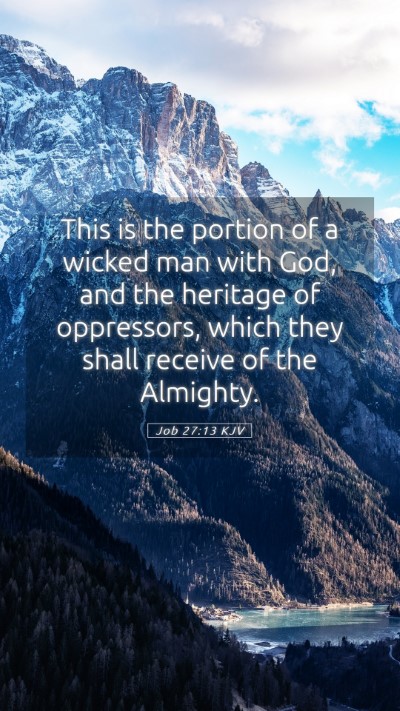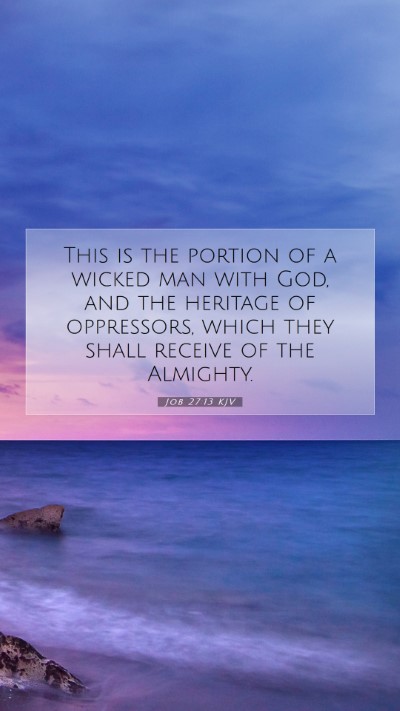Old Testament
Genesis Exodus Leviticus Numbers Deuteronomy Joshua Judges Ruth 1 Samuel 2 Samuel 1 Kings 2 Kings 1 Chronicles 2 Chronicles Ezra Nehemiah Esther Job Psalms Proverbs Ecclesiastes Song of Solomon Isaiah Jeremiah Lamentations Ezekiel Daniel Hosea Joel Amos Obadiah Jonah Micah Nahum Habakkuk Zephaniah Haggai Zechariah MalachiJob 27:13 Meaning
What is the meaning of Job 27:13?
This is the portion of a wicked man with God, and the heritage of oppressors, which they shall receive of the Almighty.
Job 27:13 Bible Verse Meaning
Job 27:13 - Understanding the Verse
Verse Reference: Job 27:13 states, "This is the portion of a wicked man with God, and the heritage of oppressors, which they shall receive of the Almighty." This verse can be a source of rich Bible verse meanings and Bible verse interpretations.
Contextual Background
The Book of Job addresses deep themes of suffering, injustice, and divine retribution, presenting a narrative that questions the simplistic view of retribution theology—the idea that good is always rewarded and evil always punished. In this chapter, Job is responding to his friends and affirming his integrity in the face of immense suffering.
Commentary Insights
-
Matthew Henry
Matthew Henry interprets this verse as Job's assertion that the wicked have a portion prepared for them, which they receive directly from God. This is highlighted by Job’s important argument that despite his misfortunes, he believes in divine justice that will ultimately manifest, affirming the notion of divine retribution. He emphasizes that God’s judgment ensures that oppressors will meet their end, as inherited by the Almighty.
-
Albert Barnes
Albert Barnes elaborates that Job methodically outlines the characteristics of a wicked individual’s fate. He notes that Job distinguishes between the immediate consequences faced in life and the ultimate destiny that awaits those who persist in wickedness. This highlights the enduring principle of Bible verse commentary regarding the moral order of the universe, implying that although the wicked may prosper temporarily, their end will be despair.
-
Adam Clarke
Adam Clarke offers a detailed examination of the term "portion," suggesting that it indicates an inheritance or share in consequences due to one’s actions. He underscores that Job's declaration serves as a solemn reminder that while the wicked may appear to lead prosperous lives, they are ultimately bound to face their deserved punishment. Clarke's analysis furthers understanding of Biblical exegesis wherein moral accountability is consistently emphasized.
In-Depth Interpretation
This verse serves as a critical reflection on the ethical dimensions of human behavior and God's judgment. It is crucial for understanding Scripture that we delve into the broader message within which Job speaks. He vehemently defends his innocence and maligns the idea that suffering directly translates to personal sinfulness.
Key Themes
- Divine Justice: Central to Job's discourse is the idea that God presides over justice. Each portion received by the wicked must be viewed in light of divine retribution.
- The Nature of Oppression: It also demonstrates the plight and judgment of oppressors, inviting readers to reflect on current societal injustices and their moral implications.
- Human Suffering: Job’s narrative encourages a deeper exploration of suffering—not as a mere punishment but as a complex interaction with divine purposes.
Cross References
- Psalm 73:17-20 - Reflects on the end of the wicked and God’s ultimate judgment.
- Proverbs 11:21 - Assurance that the wicked will not go unpunished.
- Isaiah 3:11 - A warning to the wicked about their fated consequences.
Application in Life
In applying Bible verses to daily life, Job 27:13 reminds individuals to hold steadfast to integrity and righteousness despite surrounding circumstances that may seem unjust. It is a call for personal accountability and vigilance against oppression, urging believers to stand firm in their faith and ethical convictions.
For Bible Study Groups
This verse can be a significant talking point in Bible study groups focused on the themes of suffering, justice, and morality. Engaging with such material can deepen group discussions and lead to more profound insights among members.
Conclusion
Job 27:13 is a poignant reminder of the eternal principles governing God’s justice and the fate of the wicked. By studying this verse with the insights of various commentators, one gains a richer comprehension of the meaning of Bible verses and their applicability in contemporary contexts.


